We may not have the course you’re looking for. If you enquire or give us a call on 0800 446148 and speak to our training experts, we may still be able to help with your training requirements.
Training Outcomes Within Your Budget!
We ensure quality, budget-alignment, and timely delivery by our expert instructors.
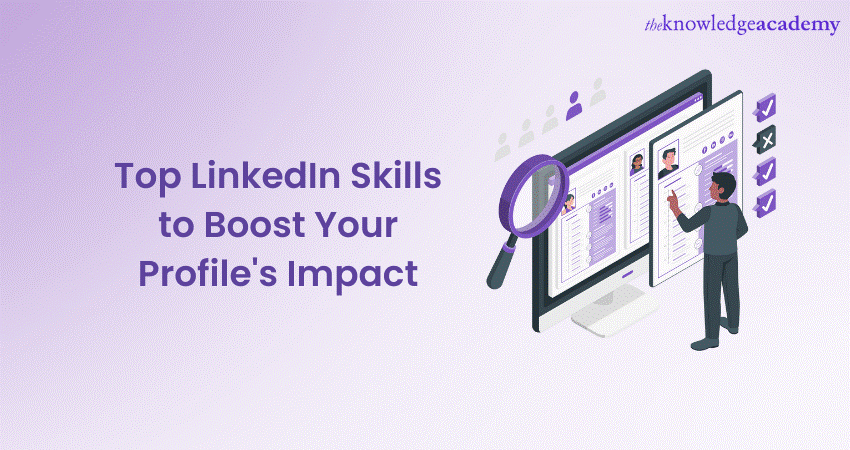
LinkedIn has evolved from a simple networking platform to a powerful professional ecosystem that offers personal branding, networking, job hunting, and industry engagement opportunities. It's not just a place to connect with colleagues; it's a space to showcase your skills, experiences, and insights. One of the key aspects that can significantly boost your profile's impact on this platform is the LinkedIn Skills section.
According to a report by LinkedIn, members with five or more skills listed are contacted up to 33x more by Recruiters and receive up to 17x more profile views. This shows that adding skills is essential for your professional growth. Further, in this blog, we will explore the significance of LinkedIn Skills, offering insights into top skills and effective strategies to enhance your profile's impact.
Table of Contents
1) Importance of LinkedIn Skills
2) Top LinkedIn Skills to boost your profile
a) Technical skills
b) Soft skills
c) Industry-specific skills
3) How to showcase your LinkedIn Skills effectively?
4) Conclusion
Importance of LinkedIn Skills
LinkedIn offers a dedicated section where users can list their skills. These skills serve as keywords that Recruiters and other users can use to find potential candidates. When your skills align with what recruiters seek, your profile is more likely to appear in search results. Here's an in-depth exploration of why skills are vital on your LinkedIn profile:
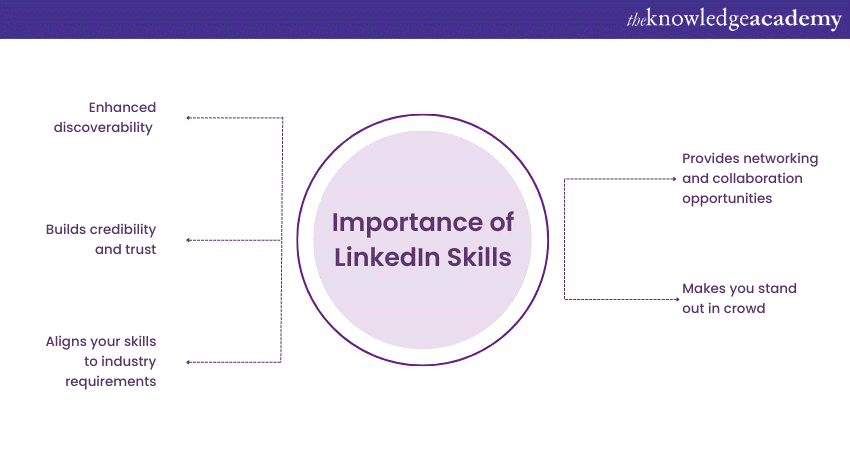
1) Enhanced discoverability
LinkedIn is more than just a social network; it's also a search engine for professionals. Recruiters, Hiring Managers, and professionals often use specific keywords when searching for potential candidates or connections on LinkedIn. Adding relevant skills to your profile increases your chances of popping up in search results. These skills act as signposts that guide others to your profile, showcasing your expertise in areas that align with their needs.
2) Credibility and trust
Highlighting your skills doesn't just list what you know; it builds credibility around your expertise. When others in your network endorse your skills, it's a form of social validation that adds a layer of authenticity to your profile. Endorsements from colleagues, supervisors, or clients help establish trust with those who visit your profile, affirming that you possess the abilities you claim.
3) Industry alignment
Industries constantly evolve due to technological advancements, changing consumer behaviours, and global market shifts. You can align yourself with industry trends by consistently updating your skills on LinkedIn. This shows potential employers that you're proactive in staying current with the latest developments in your field, making you a more attractive candidate for positions that demand up-to-date knowledge.
4) Building a personal brand
Your LinkedIn profile is an extension of your professional brand. Your skills represent the core competencies that define your brand. You craft a narrative around your expertise by selecting and highlighting the right skills. This not only attracts potential employers and clients but also helps like-minded professionals connect with you, creating opportunities for collaboration and knowledge sharing.
5) Networking and collaboration
Skills provide a common ground for networking and collaboration. When others see skills on your profile that align with their interests or goals, it sparks conversations and connections. Sharing similar skills can lead to engaging discussions, knowledge exchange, and the potential for future collaborations.
6) Standing out in a crowd
With millions of profiles on LinkedIn, standing out becomes a challenge. The skills you showcase are a unique identifier, setting you apart from the competition. Highlighting a mix of technical, soft, and industry-specific skills paints a multidimensional picture of your capabilities, increasing the probability of grabbing the attention of those seeking your expertise.
Top LinkedIn Skills to boost your profile
Listing the right LinkedIn Skills is pivotal to creating an outstanding profile. However, before adding skills to your LinkedIn profile, it's important to identify the skills that align with your industry, career goals, and the type of opportunities you're seeking. Research job descriptions in your field to understand the skills employers seek in candidates.
Here's a detailed exploration of the top and common skills you should consider adding:
1) Technical skills
Technological advancements have made technical skills highly valued across multiple industries. These skills demonstrate your proficiency in using various tools, software, and technologies. Some key technical skills to add to your LinkedIn profile include:
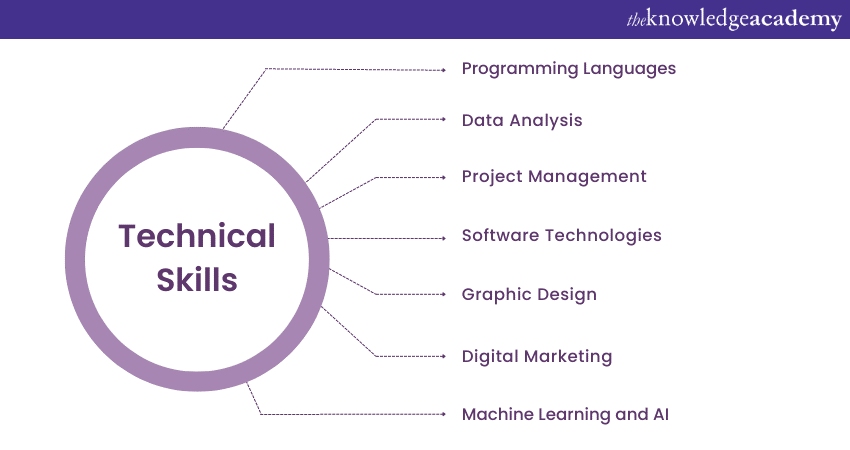
1) Programming Languages: As technology continues to shape various industries, coding and programming skills are highly sought after. Whether you're a Developer or your role involves working with technology, showcasing your coding skills on your LinkedIn profile can attract opportunities aligned with the tech landscape.
Add Programming Languages you're proficient in and highlight projects where you've utilised your coding abilities. Also, mention any coding projects, Software Development, or Web Development work you've undertaken (in college, internship, or work), and include links to showcase your skills in action.
2) Data Analysis: In a data-driven world, the ability to analyse and interpret data is in high demand across many industries. Hence, proficiency in Data Analysis tools such as Microsoft Excel, Python, R, or specialised software can set you apart. Highlight your experience in collecting, cleaning, and transforming data to draw meaningful insights that contribute to informed decision-making.
3) Project Management: Project Management skills are important for ensuring tasks are executed efficiently, and goals are met. Proficiency in planning, organising, and coordinating projects demonstrates your ability to deliver results on time and within scope. Mention any Project Management methodologies you're proficient in, such as Agile, Scrum, or Waterfall, along with examples of projects you've successfully led.
4) Software Technologies: Depending on your industry, proficiency in specific software tools can significantly enhance your profile's impact. This might include tools like Adobe Creative Suite for Designers, Microsoft Office Suite for business professionals, AutoCAD for Engineers, or Salesforce for Sales and Customer Relationship Management.
5) Graphic Design and multimedia tools: Visual content has become a critical element of communication. Expertise in Graphic Design tools like Adobe Photoshop, Illustrator, Canva, or InDesign can be a major asset, particularly in roles that involve creating visual marketing materials, presentations, or user interfaces. Share examples of designs you've created that effectively convey messages or ideas.
6) Digital Marketing: With the rising importance of online presence, Digital Marketing skills are invaluable. Showcase your expertise in Search Engine Optimisation (SEO), Content Creation, Social Media Management, Email Marketing, and Pay-Per-Click (PPC) Advertising. Also, share successful campaigns or strategies that have driven engagement and conversions.
7) Machine Learning and AI: In the era of Big Data and automation, skills in Data Science and Machine Learning are highly sought after. Highlight your ability to work with Machine Learning libraries, create predictive models, and extract insights from complex datasets. Proficiency in Machine Learning frameworks like TensorFlow or knowledge of Natural Language Processing can be highly attractive.
Master the trending AIML technologies with our Artificial Intelligence and Machine Learning Course. Register today!
2) Soft skills
While technical skills are vital for performing specific tasks, soft skills often determine how effectively you can work with others, communicate your ideas, and navigate various professional situations. Soft skills are important across industries and are crucial in building successful relationships and careers. Here are the key soft skills you should consider adding to your LinkedIn profile:
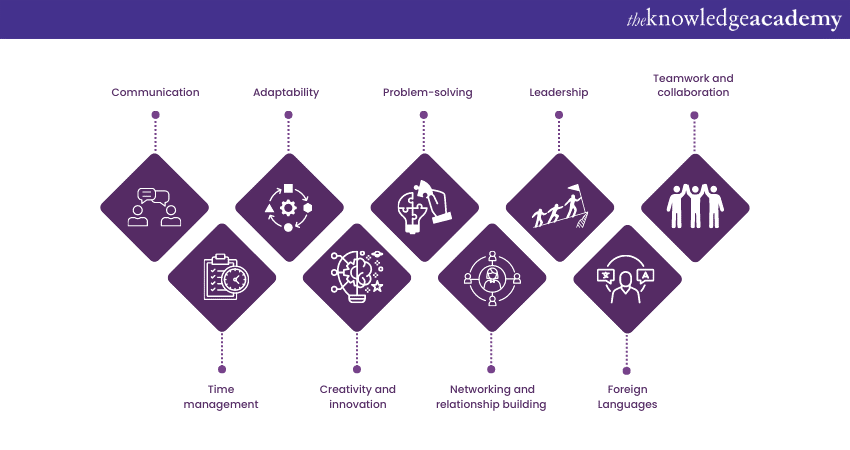
1) Communication: Effective communication is the foundation of all interactions. It's about conveying your thoughts clearly, listening actively, and tailoring your message to your audience. Whether you're drafting a post, crafting a message, or sharing insights, your ability to communicate effectively can set you apart from others.
On your LinkedIn profile, highlight instances where you've demonstrated excellent communication, such as leading presentations, writing thought-provoking articles, or participating in online discussions.
2) Adaptability: The ability to adapt to new circumstances, technologies, and work environments is a skill that's highly sought after in today's fast-paced world. Employers value individuals who can quickly pivot and thrive in situations that are outside their comfort zone.
Whether it's adopting new tools and methods or even adjusting to remote work, showcasing your adaptability can give potential connections and employers confidence in your ability to handle change and uncertainty.
3) Problem-solving: Problem-solving skills reflect your capacity to analyse challenges, devise solutions, and implement them effectively. These skills demonstrate your critical thinking abilities and your capacity to approach challenges with creativity and resilience. Use your LinkedIn profile to share stories of complex problems you've tackled, highlighting your analytical thinking, creativity, and ability to collaborate with others to reach solutions.
4) Leadership: Even if you're not in a managerial position, leadership skills like decision-making and problem-solving demonstrate initiative and responsibility. They encompass your ability to inspire, motivate, and guide others, regardless of your position in the hierarchy.
On your LinkedIn profile, showcase situations where you've led projects, mentored colleagues, or facilitated teamwork. Leadership skills are particularly valuable as they indicate your potential to influence positive change and contribute to the growth of organisations.
5) Teamwork and collaboration: In today's interconnected and globalised work landscape, collaboration is essential. Being able to work harmoniously with colleagues from diverse backgrounds and disciplines can lead to more creative solutions and better outcomes. Your ability to contribute your strengths while respecting others' perspectives is a skill worth showcasing on your LinkedIn profile.
6) Time management: The skill of managing your time is a testament to your organisational abilities and your dedication to producing high-quality work within deadlines. Highlight instances where you've successfully juggled multiple tasks, met project milestones or maintained a consistent work-life balance. Employers value individuals who can optimise their time and resources to achieve both individual and team goals.
7) Creativity and innovation: Creativity is the driving force behind problem-solving and innovation. Whether you're in a creative industry like design or working in a more analytical role, showcasing your ability to think outside the box can demonstrate your potential for generating new ideas and approaches. Share projects, concepts, or initiatives where your creative thinking played a pivotal role in achieving success.
8) Networking and relationship building: LinkedIn itself is a networking platform, and the skill of networking is essential for building valuable connections and opportunities. Highlight instances where you've actively engaged with others in your industry attended networking events or collaborated on projects that resulted from your network.
9) Emotional intelligence: Emotional intelligence, also known as EQ, is the ability to recognise and manage your own emotions while understanding and empathising with the emotions of others. EQ plays a crucial role in effective communication, collaboration, and building strong relationships. Highlight instances where you've demonstrated empathy, handled difficult situations gracefully or fostered a positive work environment.
10) Foreign languages: Multilingualism is a skill that can open doors to international opportunities and cross-cultural communication. If you're proficient in languages other than your native language, mention them on your LinkedIn profile. Fluency in multiple languages can be particularly helpful in roles involving global business, translation, or international relations.
Unlock your full potential with our Time Management Training for effective personal development. Join now!
3) Industry-specific skills
Industry-specific skills are directly relevant to the field in which you work. These skills showcase your expertise and demonstrate that you possess the specialised knowledge required to excel in your domain. Further, adding industry-specific skills to your LinkedIn profile can help you stand out to employers and clients within your niche.
Here's a closer look at some industry-specific skills you can highlight on your profile:
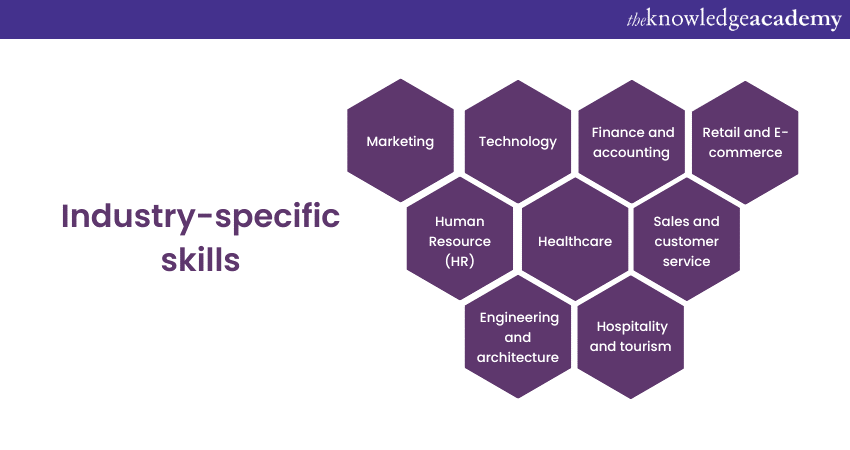
1) Marketing: In the marketing and PR realm, skills in Brand Management, Content Strategy, Media Relations, Social Media Analytics, and Campaign Measurement are vital. Showcase successful campaigns, Social Media engagement metrics, and instances where your efforts contributed to increased brand visibility and engagement.
2) Technology: In the technology sector, staying updated with the latest trends and tools is essential. Showcase skills such as Cybersecurity, Cloud Computing, Software Development, Network Administration, and proficiency in Programming Languages like Java, Python, or JavaScript. Highlight any certifications you've earned, such as Amazon Web Services (AWS) certifications.
3) Finance and accounting: Finance professionals need a strong grasp of financial principles and analytical skills. Emphasise skills in Financial Modelling, Risk Management, and Investment Analysis, and proficiency in financial software such as Excel, Bloomberg, or Tableau. Certifications like Chartered Financial Analyst (CFA) or Certified Public Accountant (CPA) can set you apart in the competitive finance industry.
4) Retail and E-commerce: For professionals in retail and E-commerce, skills in Inventory Management, Supply Chain Optimisation, E-commerce platform proficiency, data-driven decision-making, and customer experience enhancement are critical. Highlight instances where you've managed successful product launches, optimised inventory turnover, or implemented strategies that led to increased online sales and customer engagement.
5) Human Resource (HR): In the era of Human Resources (HR), skills related to Recruitment, Talent Management, Employee Relations, HR Analytics, and Organisational Development are vital. Showcase your ability to create effective HR policies, improve employee engagement, and contribute to a positive workplace culture. Highlight instances where you've successfully recruited top talent or implemented innovative HR strategies that boosted employee satisfaction and productivity.
6) Healthcare: The healthcare industry demands a blend of medical knowledge and technical expertise. Highlight skills like Medical Coding, Electronic Health Records (EHR) Management and proficiency in medical terminology and healthcare-specific software. Certifications like Certified Medical Coder (CMC) or Electronic Health Records Specialist (EHRS) can bolster your credibility.
7) Sales and customer service: This type of industry revolves around building relationships, understanding customer needs, and delivering value. Professionals in this sector require a balance of interpersonal skills, business acumen, and a customer-centric approach. If you are from a sales background, highlight skills related to communication, product knowledge, negotiation, empathy and problem-solving abilities.
8) Engineering and architecture: In the fields of engineering and architecture, technical expertise and creative problem-solving are paramount. Here, proficiency in CAD Software, Structural Analysis, Project Management, Blueprint Interpretation, and compliance with building codes is crucial. Showcase projects demonstrating innovative designs, complex project management, and sustainable solutions.
Emphasise effective collaboration, clear communication of technical concepts, and the balance of aesthetics and functionality in architecture. Highlighting contributions to successful projects exemplifies your capabilities in these fields and attracts relevant connections and opportunities.
9) Hospitality and tourism: For professionals in hospitality and tourism, customer service and interpersonal skills are crucial. Highlight expertise in Guest Relations, Event Planning, Hospitality Management Software, and languages relevant to the region. Share instances where your exceptional customer service led to positive guest experiences.
Elevate your LinkedIn presence and master the art of effective networking with our LinkedIn Marketing Masterclass. Join now to unlock new opportunities!
How to showcase your LinkedIn Skills effectively?
Having a laundry list of skills on your LinkedIn profile is a good start, but to truly make an impact, you need to showcase those skills strategically. Here's how to optimise the display of your LinkedIn Skills:
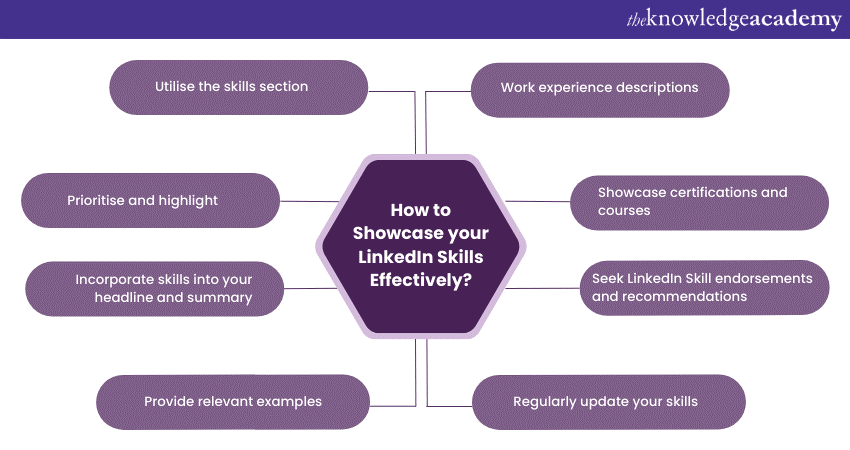
1) Utilise the skills section
LinkedIn provides a dedicated “skills section” where you can list your competencies. However, don't fall into the trap of listing every skill you possess. Prioritise skills that are most relevant to your current goals and industry. Be specific and avoid vague terms. Instead of just saying "communication," you might list "public speaking," "written communication," and "cross-functional collaboration."
2) Prioritise and highlight
While you may add up to 50 skills on LinkedIn, focusing on the most relevant ones is important. Prioritise skills that align with your current goals and industry trends. Arrange them based on their importance to convey a clear hierarchy of your capabilities. Highlighting your top skills increases their visibility and helps viewers quickly understand your core competencies.
3) Incorporate skills into your headline and summary
Your LinkedIn headline and summary are prime real estate for showcasing your skills. Incorporate key skills into your headline to immediately give visitors a sense of your expertise. For example, instead of a generic headline like "Marketing Professional," consider "Digital Marketing Strategist | SEO Specialist | Content Creator." In your summary, craft a narrative that weaves your skills into your professional journey.
4) Provide relevant examples
Don't just list your skills; show how you've implemented them. In the experience section of your profile, provide specific examples of how you've used your skills to achieve goals, solve problems, or contribute to projects. Use the Situation, Task, Action, Result (STAR) method to structure your accomplishments. Quantify your achievements whenever possible. For instance, instead of saying you "improved customer satisfaction," state that you "increased customer satisfaction by 20% through targeted communication strategies."
5) Work experience descriptions
Within each work experience, highlight the skills you applied to accomplish specific tasks or projects. Instead of simply listing the skills, provide context by explaining how you utilised them to achieve results. For example, if you're describing a project where you used Data Analysis skills to optimise marketing campaigns, elaborate on the impact your analysis had on improving campaign performance.
6) Showcase certifications and courses
If you've completed relevant certifications or courses, add them to your LinkedIn profile. Many skills are honed through formal education and training. Whether it's a Digital Marketing certification, a Project Management course, or language proficiency exams, these achievements show your commitment to skill development and continuous learning.
7) Seek LinkedIn Skill endorsements and recommendations
Skill endorsements and recommendations from colleagues, supervisors, and clients can validate your skills. Regularly endorse the skills of others in your network, and politely request endorsements in return. Further, you can ask your colleagues or supervisors for recommendations that specifically highlight your key skills. These endorsements and recommendations provide social proof of your capabilities.
8) Regularly update and refresh
Skills and industries evolve over time. Regularly review and update your skills to reflect your current competencies and the changing demands of the job market. Remove skills that are no longer relevant or add new ones that have become important in your field.

Conclusion
Overall, your LinkedIn profile is a digital representation of your professional identity. Enhancing your profile with the right LinkedIn Skills can significantly amplify your professional presence and impact. By strategically highlighting industry-specific, soft, and technical skills, you can capture the attention of recruiters and potential employers. So, invest in your LinkedIn Skill development, and let your profile truly reflect your expertise.
Refine your interview skills and boost your career prospects with our Interview Skills Training. Register today for success in your next job interview!
Frequently Asked Questions
Upcoming Digital Marketing Resources Batches & Dates
Date
 LinkedIn Marketing Course
LinkedIn Marketing Course
Fri 27th Dec 2024
Fri 3rd Jan 2025
Fri 28th Mar 2025
Fri 23rd May 2025
Fri 4th Jul 2025
Fri 5th Sep 2025
Fri 24th Oct 2025
Fri 5th Dec 2025







 Top Rated Course
Top Rated Course


 If you wish to make any changes to your course, please
If you wish to make any changes to your course, please


